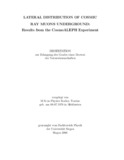Citation link:
https://nbn-resolving.org/urn:nbn:de:hbz:467-2500Files in This Item:
| File | Description | Size | Format | |
|---|---|---|---|---|
| tcaciuc.pdf | 24.93 MB | Adobe PDF |  View/Open |
| Dokument Type: | Doctoral Thesis | metadata.dc.title: | Lateral distribution of cosmic ray muons underground : Results from the CosmoALEPH experiment Lateralverteilung kosmischer Myonen unter der Erde : Ergebnisse des CosmoALEPH Experiments |
Authors: | Tcaciuc, Rodica | Institute: | Fachbereich 7, Physik | Free keywords: | CosmoALEPH, Muon Lateralverteilung | Dewey Decimal Classification: | 520 Astronomie, Kartographie | GHBS-Clases: | VEBD | Issue Date: | 2006 | Publish Date: | 2007 | Abstract: | The CosmoALEPH experiment, located underground at the LEP e+e? storage ring at CERN at a depth of 320 m water equivalent, was used to study the chemical composition of primary cosmic rays up to 10 PeV energies from the measurement of high energy muons, created in extensive air showers by interactions of primary nuclei in the atmosphere. The Time Projection Chamber (TPC) and the Hadron Calorimeter of the ALEPH detector and six scintillator stations located at distances up to 1 km from each other were used to analyse the decoherence curve, multiplicity and transverse momentum distributions of energetic cosmic muons. The experimental data were compared with predictions from different Monte Carlo (MC) models and mass composition approaches. From a comparison between the measured decoherence distribution with CosmoALEPH and the MC predicted decoherence curves for proton, helium and iron, a primary composition of (77±11) % protons and (23±11) % iron nuclei with a ?2 - probability of 84 % was determined, based on the predictions of the VENUS model with the constant mass composition approach. The analysis of the decoherence curve, with consideration of correlations between the measured CosmoALEPH parameters, leads to a composition of (88 ± 8) % protons and (12 ± 8) % iron nuclei for cosmic rays with a ?2 -probability of 53 %. The absolute comparison between the measured multiplicity and transverse momentum distributions in the TPC and those predicted by different Monte Carlo models results also in a dominant light composition. The experimental data are in a good agreement with MC data lying between proton and helium primaries. The results obtained for the primary composition of cosmic rays up to the knee region are consistent with the results from other experiments. Das CosmoALEPH Experiment am LEP e+e? Speicherring am CERN ist in einer Tiefe von 320 Metern Wasser Äquivalent installiert. Es wurde benutzt, um die chemische Zusammensetzung der primären kosmischen Strahlung bis zu Energien von 10 PeV aus den Daten hochenergetischer Myonen abzuleiten. Diese Myonen wurden in ausgedehnten Luftschauern ausgelöst durch Wechselwirkungen primärer Kerne in der Atmosphäre erzeugt. Die Zeit-Projections-Kammer (TPC) und das Hadron Kalorimeter (HCAL) des ALEPH Detectors und sechs Szintillatorstationen mit Abständen bis 1 km wurden benutzt, um die Dekoh¨arenzkurve, die Multiplizität und die Transversalimpulsverteilung hochenergetischer Myonen zu bestimmen. Die experimentellen Daten wurden mit Vorhersagen verschiedener Monte Carlo Modelle (MC) verglichen. Aus dem Vergleich der gemessenen Dekohärenzkurve mit MC Vorhersagen für primäre Proton-, Helium- und Eisenkerne wurde auf der Basis des VENUS Modells eine Häufigkeit von (77±11) % Protonen und (23±11) % Eisen mit einer ?2 - Wahrscheinlichkeit von 84 % bestimmt. Die Dekohärenzkurve, unter Berücksichtigung der Korrelationen führt zu einer Häufigkeit von (88 ± 8) % Proton- und (12 ± 8) % Eisen Kernen bei einer ?2 - Wahrscheinlichkeit von 53 %. Der Vergleich zwischen den Multiplizitäts- und Transversalimpulsverteilunge nmit MC Modellen führt ebenfalls zu einer Proton-Helium Dominanz. Die Ergebnisse bezüglich der Häufigkeit der chemischen Elemente in der primären kosmischer Strahlung bis zu 10 PeV sind in Übereinstimung mit den Ergebnissen anderer Experimente. |
URN: | urn:nbn:de:hbz:467-2500 | URI: | https://dspace.ub.uni-siegen.de/handle/ubsi/250 | License: | https://dspace.ub.uni-siegen.de/static/license.txt |
| Appears in Collections: | Hochschulschriften |
This item is protected by original copyright |
Page view(s)
624
checked on Nov 28, 2024
Download(s)
355
checked on Nov 28, 2024
Google ScholarTM
Check
Items in DSpace are protected by copyright, with all rights reserved, unless otherwise indicated.

